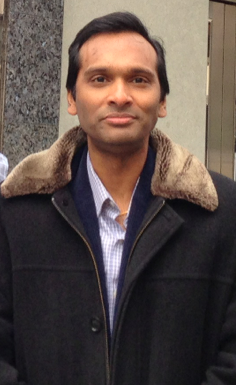Arul Chinnaiyan
Arul M. Chinnaiyan is an influential figure in the field of cancer research, particularly known for his work in the discovery of gene fusions in prostate cancer. He is an American pathologist and investigator at the Howard Hughes Medical Institute, as well as the S.P. Hicks Endowed Professor of Pathology at the University of Michigan Medical School. Chinnaiyan's research has significantly contributed to the understanding of the molecular mechanisms underlying cancer, leading to the development of new diagnostic and therapeutic strategies.
Early Life and Education[edit | edit source]
Arul M. Chinnaiyan was born in India and moved to the United States, where he pursued his higher education. He completed his undergraduate degree in biology at the University of Michigan, Ann Arbor. Following this, Chinnaiyan stayed at the University of Michigan, where he earned an M.D. and a Ph.D. in Pathology. His doctoral work laid the foundation for his future research in cancer biology.
Career and Research[edit | edit source]
After completing his education, Chinnaiyan joined the faculty at the University of Michigan Medical School, where he has made significant strides in cancer research. He is the director of the Michigan Center for Translational Pathology (MCTP), where his team focuses on applying high-throughput technologies to identify and characterize alterations in the cancer genome.
One of Chinnaiyan's most notable contributions to cancer research is the discovery of recurrent gene fusions in prostate cancer, particularly the TMPRSS2-ERG gene fusion. This discovery, made in 2005, was groundbreaking because it was the first time such gene fusions, commonly associated with leukemias and sarcomas, were identified in solid tumors. This work has opened new avenues for the diagnosis, prognosis, and treatment of prostate cancer and has been extended to other cancers as well.
Chinnaiyan's research has also led to the development of novel biomarkers and therapeutic targets for cancer. His work in integrating genomics and proteomics has been instrumental in understanding the complex molecular landscape of cancer, leading to more personalized approaches to cancer treatment.
Awards and Honors[edit | edit source]
Arul M. Chinnaiyan has received numerous awards and honors for his contributions to cancer research, including:
- The Paul Marks Prize for Cancer Research
- The American Association for Cancer Research (AACR) Outstanding Achievement Award
- Election to the National Academy of Medicine
- The Breakthrough Prize in Life Sciences
These accolades reflect his significant impact on the field of cancer research and his contributions to advancing our understanding of the disease.
Impact and Legacy[edit | edit source]
Arul M. Chinnaiyan's work has fundamentally changed the way scientists and clinicians approach the diagnosis and treatment of cancer. His discovery of gene fusions in solid tumors has paved the way for the development of targeted therapies, offering hope to patients with previously untreatable forms of cancer. Through his leadership at the Michigan Center for Translational Pathology, Chinnaiyan continues to push the boundaries of cancer research, with the ultimate goal of improving patient outcomes.
Search WikiMD
Ad.Tired of being Overweight? Try W8MD's physician weight loss program.
Semaglutide (Ozempic / Wegovy and Tirzepatide (Mounjaro / Zepbound) available.
Advertise on WikiMD
|
WikiMD's Wellness Encyclopedia |
| Let Food Be Thy Medicine Medicine Thy Food - Hippocrates |
Translate this page: - East Asian
中文,
日本,
한국어,
South Asian
हिन्दी,
தமிழ்,
తెలుగు,
Urdu,
ಕನ್ನಡ,
Southeast Asian
Indonesian,
Vietnamese,
Thai,
မြန်မာဘာသာ,
বাংলা
European
español,
Deutsch,
français,
Greek,
português do Brasil,
polski,
română,
русский,
Nederlands,
norsk,
svenska,
suomi,
Italian
Middle Eastern & African
عربى,
Turkish,
Persian,
Hebrew,
Afrikaans,
isiZulu,
Kiswahili,
Other
Bulgarian,
Hungarian,
Czech,
Swedish,
മലയാളം,
मराठी,
ਪੰਜਾਬੀ,
ગુજરાતી,
Portuguese,
Ukrainian
Medical Disclaimer: WikiMD is not a substitute for professional medical advice. The information on WikiMD is provided as an information resource only, may be incorrect, outdated or misleading, and is not to be used or relied on for any diagnostic or treatment purposes. Please consult your health care provider before making any healthcare decisions or for guidance about a specific medical condition. WikiMD expressly disclaims responsibility, and shall have no liability, for any damages, loss, injury, or liability whatsoever suffered as a result of your reliance on the information contained in this site. By visiting this site you agree to the foregoing terms and conditions, which may from time to time be changed or supplemented by WikiMD. If you do not agree to the foregoing terms and conditions, you should not enter or use this site. See full disclaimer.
Credits:Most images are courtesy of Wikimedia commons, and templates Wikipedia, licensed under CC BY SA or similar.
Contributors: Prab R. Tumpati, MD

